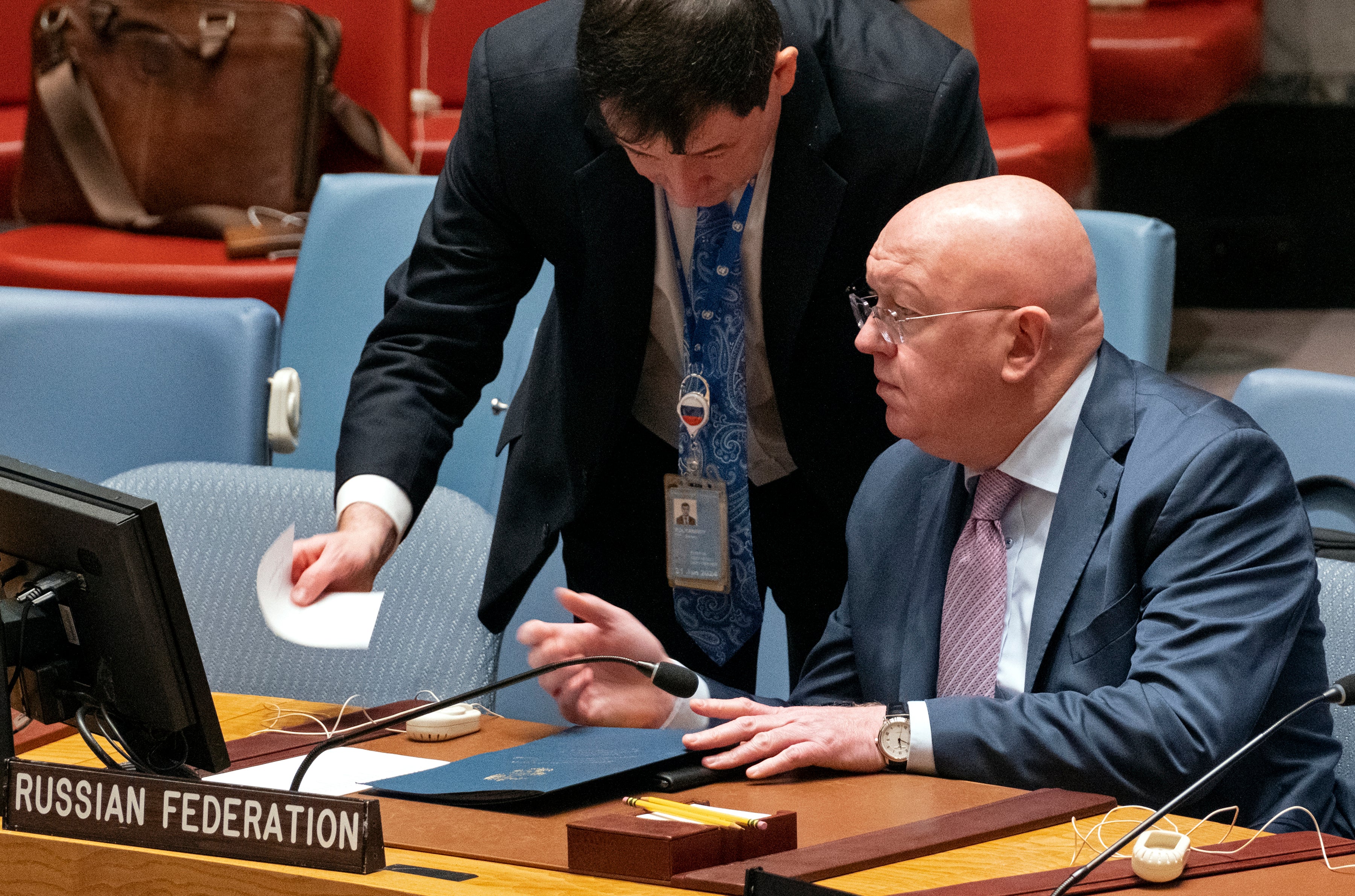Security Council rejects Russian call for bio weapons probe
The U.N. Security Council has overwhelmingly rejected Russia’s attempt to establish a commission to investigate its unfounded claims that Ukraine and the United States are carrying out “military biological” activities that violate the convention prohibiting the use of biological weapons

Your support helps us to tell the story
From reproductive rights to climate change to Big Tech, The Independent is on the ground when the story is developing. Whether it's investigating the financials of Elon Musk's pro-Trump PAC or producing our latest documentary, 'The A Word', which shines a light on the American women fighting for reproductive rights, we know how important it is to parse out the facts from the messaging.
At such a critical moment in US history, we need reporters on the ground. Your donation allows us to keep sending journalists to speak to both sides of the story.
The Independent is trusted by Americans across the entire political spectrum. And unlike many other quality news outlets, we choose not to lock Americans out of our reporting and analysis with paywalls. We believe quality journalism should be available to everyone, paid for by those who can afford it.
Your support makes all the difference.The U.N. Security Council on Wednesday overwhelmingly rejected Russia’s attempt to establish a commission to investigate its unfounded claims that Ukraine and the United States are carrying out “military biological” activities that violate the convention prohibiting the use of biological weapons.
Russia only got support from China in the vote, with the U.S., Britain and France opposing the Russian resolution and the 10 other council nations abstaining.
The 2-3-10 vote reflected the council’s continuing opposition and skepticism about Russia’s actions since its Feb. 24 invasion of Ukraine.
Russia had circulated a 310-page document to council members last week alleging that this biological activity is taking place in Ukraine with support from the U.S. Defense Department.
THIS IS BREAKING NEWS. Previous story is below:
The U.N. Security Council scheduled a vote Wednesday on a resolution that would establish a commission to investigate unfounded Russian claims that Ukraine and the United States are carrying out “military biologcal" activities that violate the convention prohibiting the use of biological weapons.
Russia circulated a 310-page document to council members last week alleging that this biological activity is taking place in Ukraine with support from the U.S. Defense Department. The document included an official complaint to the Security Council, allowed under Article VI of the 1972 biological weapons convention, and a draft resolution that would authorize the Security Council to set up a commission comprising the 15 council members to investigate Russia’s claims.
Russia’s initial allegation of secret American biological warfare labs in Ukraine, made soon after its Feb. 24 invasion of its smaller neighbor, has been disputed by independent scientists, Ukrainian leaders and officials at the White House and Pentagon. An Associated Press investigation in March found the claim was taking root online, uniting COVID-19 conspiracy theorists, QAnon adherents and some supporters of former President Donald Trump.
Ukraine does have a network of biological labs that have gotten funding and research support from the U.S. They are owned and operated by Ukraine and are part of an initiative called the Biological Threat Reduction Program that aims to reduce the likelihood of deadly outbreaks, whether natural or manmade. The U.S. efforts date back to work in the 1990s to dismantle the former Soviet Union’s program for weapons of mass destruction.
In September, the 197 state parties to the biological weapons convention met at Russia’s request on the activities at biological laboratories in Ukraine, but a final report said it wasn’t possible to reach consensus.
Diplomats said it is highly unlikely that the Russian draft resolution will be adopted by the Security Council when it is put to a vote, expected late Wednesday afternoon. Approval requires a minimum nine “yes” votes and no veto by one of the five permanent members -- the U.S., Britain, France, Russia and China.
Russia called a Security Council meeting on its claims last Thursday, which the United States and its Western allies vehemently dismissed.
U.S. Ambassador Linda Thomas-Greenfield called the meeting “a colossal waste of time” and rejected Russia’s allegation as “pure fabrications brought forth without a shred of evidence.” She said the claim is part of a Moscow “disinformation campaign” that is attempting “to distract from the atrocities Russian forces are carrying out in Ukraine and a desperate tactic to justify an unjustifiable war.”
“Ukraine does not have a biological weapons program,” she said. “The United States does not have a biological weapons program. There are no Ukrainian biological weapons laboratories supported by the United States.”
Russia’s U.N. Ambassador Vassily Nebenzia accused the U.S. of conducting work in Ukraine with deadly pathogens — including cholera, plague, anthrax and influenza — that couldn’t be justified under the guise of public health. He said documents and evidence recovered by Russian authorities suggested a military application.
Nebenzia told the Security Council that the Russian military during its time in Ukraine had recovered drones capable of spraying bioagents as well as documents that he said related to research on the possibility of spreading pathogens through bats and migrating birds.
Thomas-Greenfield countered that Russia’s claims are “absurd for many reasons, including because such species, even if they could be weaponized, would pose as much a threat to the European continent and to Ukraine itself as they would to any other country.”
___
Associated Press writer David Klepper contributed to this report.